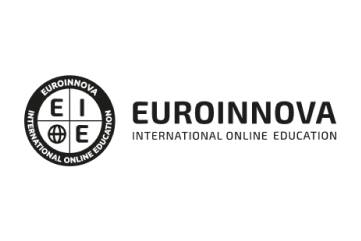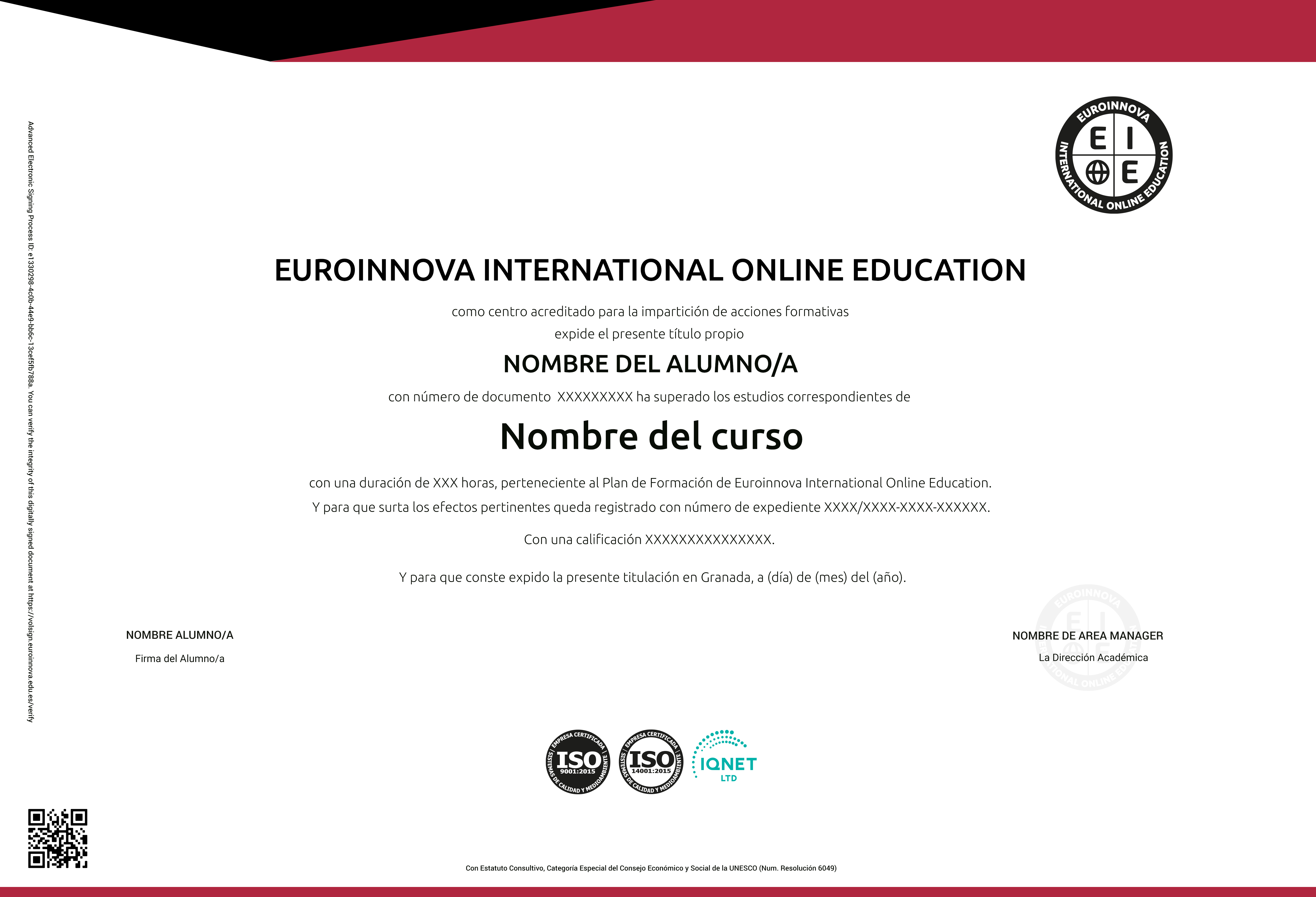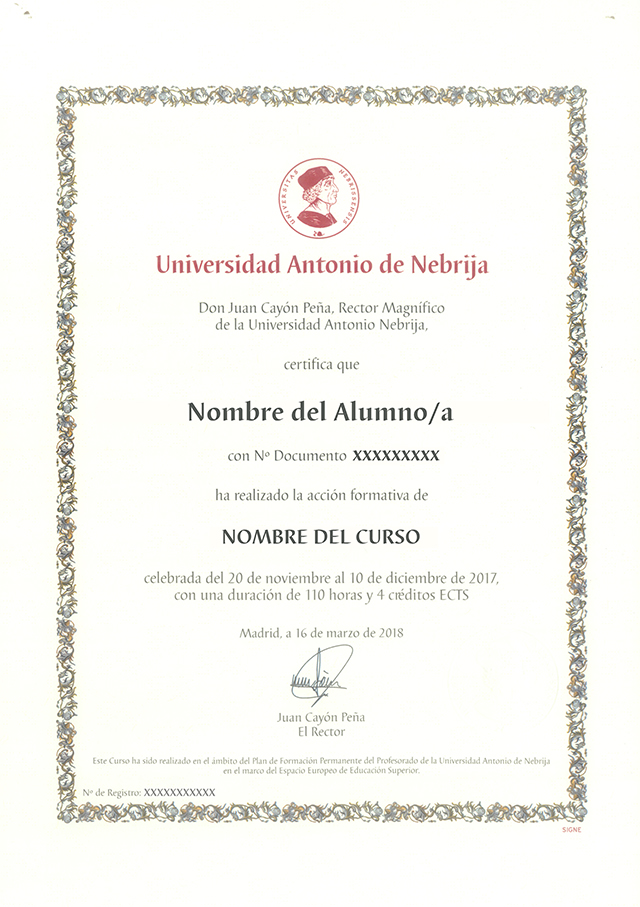Master of Director of Children's and Primary Schools + University Degree (5 ECTS credits)

Request information


Syllabus
Download syllabus in PDFCurriculum
Resumen
This Master of Educational Centers offers you a specialized training in the field. To provide education, an establishment is necessary in which this activity can be exercised in the best possible way, handling the possible conflicts that may be experienced and giving quick solutions to the situations that require them. Carrying out this Master of Director of Children's and Primary schools will know the fundamental aspects about the direction of an educational center, covering topics such as organization, management systems, etc.
Objetivos
Salidas profesionales
Para que te prepará
This Master of Educational Centers offers you a specialized training in the field. To provide education, an establishment is necessary in which this activity can be exercised in the best possible way, handling the possible conflicts that may be experienced and giving quick solutions to the situations that require them. Carrying out this Master of Director of Children's and Primary schools will know the fundamental aspects about the direction of an educational center, covering topics such as organization, management systems, etc.
A quién va dirigido
The present Master Direction is aimed at all those who want to undertake a professional activity that allows them to manage primary schools.
Carácter Oficial
This training is not included in the scope of official regulated training (Infant Education, Primary Education, Secondary Education, Official Professional Training FP, Baccalaureate, University Degree, Official University Master and PhD). It is therefore a complementary and/or specialization training, aimed at acquiring certain skills, skills or aptitudes of a professional nature, being able to be barely as merit in workbags and/or opposition competitions, always within the complementary training section and/or continuous training being always essential to review the specific requirements of the public labor stock of the public labor stock market.

Nuestra metodología combina tecnología, pedagogía y empatía para un aprendizaje a tu medida.
Tú marcas el ritmo, decides el camino y una inteligencia artificial te acompaña para que aprendas mejor, con sentido y propósito.

Aprendizaje personalizado de verdad
Tu estilo, intereses y nivel definen el recorrido. Tú eres el punto de partida.

Constructivismo en acción
Explora, experimenta y aplica. Aprender significa entender, no memorizar.

IA que te acompaña, no que te dirige
PHIA, nuestra asistente de inteligencia artificial te guía sin limitar tu autonomía.

Evaluación sin presión
Feedback continuo y adaptativo. Porque aprender es un proceso, no una cifra.
Certification


Double degree: - Titling of Master of Director of Children's and Primary Colleges with 1500 hours issued by Euroinnova International Online Education, member of the AEEN (Spanish Association of Business Schools) and recognized with the academic excellence in online education by QS World University Rankings. - University degree of management and management of educational centers with 125 hours and 5 ECTS university credits. Scoring course as merits for access oppositions to the teaching public function in all CC. AA., According to R.D. 276/2007 of February 23 (BOE 2/3/2007). This is carried out within the permanent training plan of the Antonio de Nebrija University


Becas EducaHub
Haz tu formación más accesible: financia al 0% interés y obtén becas personalizadas.
En EducaHub creemos que la educación debe estar al alcance de todos. Por eso, ofrecemos un Plan de Becas que facilita tu acceso a una formación práctica, actual y de calidad, eliminando barreras económicas.
-25%
Beca Alumni: para antiguos alumnos de EducaHub.
-20%
Beca Desempleo: si acreditas estar en situación de desempleo.
-20%
Beca Familia Numerosa: para familias con 3 o más hijos/as.
-20%
Beca Discapacidad: para personas con discapacidad ≥33%.
-15%
Beca Emprende: para autónomos/as que acrediten su actividad.
-15%
Beca Recomienda: si vienes recomendado por un exalumno.
-15%
Beca Grupo: para inscripciones conjuntas de 3 o más personas.

Todo un universo educativo,en una sola plataforma.
Un entorno intuitivo con IA que te guía para formarte de forma autónoma y con propósito.

Aprende a tu ritmo
Cursos, másteres y titulaciones oficiales. 100% online, flexibles y a tu ritmo.

Accede desde cualquier lugar
Disponible 24/7 en móvil, tablet o PC. Tú decides cuándo y cómo formarte.

Phia, tu mentora IA
Te reta, te motiva y personaliza tu camino. Aprende con una guía que evoluciona contigo.

LX One Plus: Formación sin límites
Desbloquea soft skills, idiomas y más. Avanza hacia una formación integral y continua.



